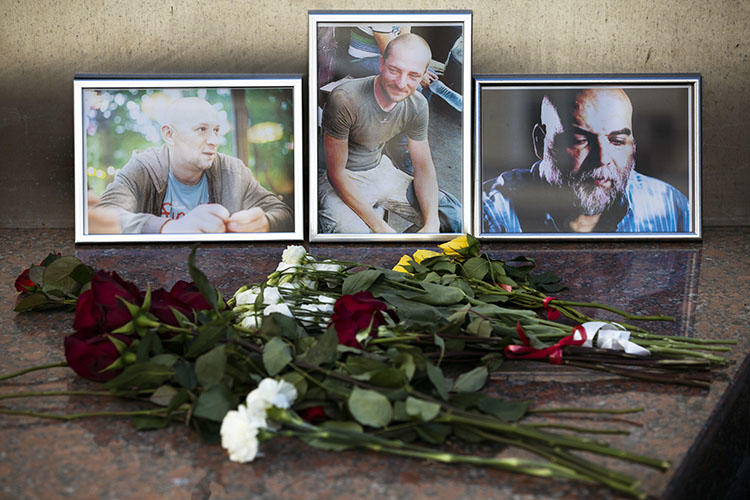New York, August 1, 2018–The Committee to Protect Journalists today called on the Central African Republic, Russia, and the U.N. to investigate the deaths of three Russian journalists killed while on assignment in CAR.
On July 31, local authorities alerted the United Nations (UN) mission in CAR, known as MINUSCA, that the bodies of three Caucasian males and a vehicle with bullet holes in it were found about 30 kilometers north of the northern town of Sibut, Vladimir Monteiro, spokesperson and head of media relations for MINUSCA, told CPJ.
A statement from the Russian Foreign Ministry said the attack took place on July 30 and that identification papers found with the bodies identified them as freelance reporter Orkhan Dzhemal, documentary director Aleksandr Rastorguyev, and camera person Kirill Radchenko.
A statement issued by the Moscow-based investigative media outlet The Investigations Management Centre (TsUR), financed by exiled Russian businessman Mikhail Khodorkovsky, said the journalists were on assignment for TsUR, investigating private Russian mercenaries, including a group known as Wagner, allegedly working in the Central African Republic. TsUR’s chief editor, Andrey Konyakhin, told CPJ the journalists left Moscow on July 27, and that the last communication with them was the evening of July 29.
“Those responsible for the killing of Orkhan Dzhemal, Aleksandr Rastorguyev, and Kirill Radchenko must be brought to justice,” Angela Quintal, CPJ’s Africa program coordinator, said from Harare, Zimbabwe. “Authorities in the Central African Republic, the Russian government and the U.N., should act swiftly to conduct comprehensive and transparent investigations into these deaths and ensure the killing of journalists, which is the most brutal form of censorship, is not permitted to take place with impunity.”
Russian Foreign Ministry spokesperson Maria Zakharova told the state television station Rossiya 24 that embassy diplomats have identified the bodies and were working with local authorities to investigate the killing. She added that the men traveled to CAR as tourists and the embassy was not aware of their presence in the country. Zakharova said that authorities were working on transporting the bodies to Russia. The Russian Investigative Committee said in a July 31 statement that it has opened a criminal investigation into the killings.
Dzhemal’s wife, Irina Gordienko, told CPJ she had seen a photograph of the bodies, and that one of them belonged to her husband.
Ange Maxime Kazagui, minister of communication and spokesperson for the CAR government, said that the journalists’ driver, who survived after fleeing, told the government that the attackers did not speak in French or Sango, the other national language of CAR.
Kazagui said that the journalists entered the country using tourist visas and had not registered for media accreditation. The government is cooperating with the U.N. and the Russian government to investigate the deaths, Kazagui told CPJ.
Monteiro told CPJ that, contrary to frequent practice for press in CAR, MINUSCA had not been informed of the journalists’ activities.
At least one other journalist has been killed in CAR in relation to their work since CPJ began keeping records in 1992. Camille Lepage, a freelance French photojournalist, was killed in 2014 during an ambush on the troops with whom she was embedded. CAR has grappled with a humanitarian crisis caused in part by years of violence between rival militias, according to the U.N.
